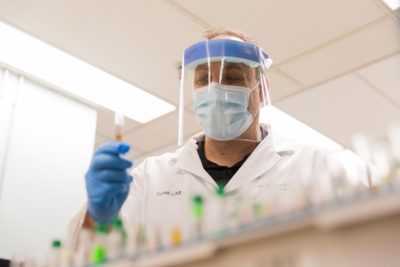By Christy Janssens
Although often hidden from view, laboratory staff play a crucial role in determining whether someone has COVID-19.
Seven days a week, 24 hours a day, staff in Lab Services at St. Joseph’s Health Centre are working. They handle and test suspected COVID-positive patient samples, or patients under investigation (PUI). They discover who has COVID-19.
“Hospital laboratories are at the heart of medical decisions made by clinicians every day,” says Jeffrey Companion, Operations Lead within the Core Lab at St. Joseph’s. “Although the lab is not often seen, we are constantly at work to ensure our patients get the best care possible.”
The Lab Services teams at St. Joseph’s encompass multiple disciplines and departments tied together with one theme: handling and testing patient samples to support medical diagnosis and treatment.
The Phlebotomy team obtains blood specimens from inpatients and outpatients, ranging from neonates to the elderly.
The Transfusion Medicine team provides blood products in a safe, efficient and timely manner for routine and Emergency patient care.
The Chemistry team analyzes blood and other bodily fluids to support clinical investigations of metabolic and endocrine disorders, cancer, toxicology and serology.
The Immunology team identifies autoantibodies that cause various autoimmune diseases, and assesses immunodeficiency and other immune system disturbances.

The Hematology team tests for blood disorders like leukemia, anemia, coagulation disorders, and can also detect infection.
The Anatomical Pathology and Cytology teams provide histology services and examine cells and tissue components to aid in the diagnostic interpretation of disease processes.
The Microbiology team examines and identifies bacteria, fungi and viruses.
Point of Care testing is performed at the patient bedside to collect and rapidly analyze samples on the spot.
The tests performed by these teams provide important information for medical staff making treatment decisions. The teams work quickly, too, with many of the tests turned around within 30-60 minutes, says Companion.
The Phlebotomy team’s workload increased once the pandemic hit, says Yvette Williams, an Operational Leader in the divisions of Microbiology, Specimen Procurement and Pathology. They had an increase in blood draws and more PPE to put on before entering a patient room, but still needed to maintain expected turnaround times. As a result, they strengthened their resolve to support each other through this challenging time.
“The Microbiology staff pulled together as a team to navigate through the unprecedented increase in workload, primarily due to the number of Covid-19 swabs sent to the lab for testing,” says Williams “Their professionalism and dedication to each other and our patients remains unwavering.”
Inside the lab, the staff has donned more PPE to handle suspected or confirmed COVID samples, says Dr. Maria Pasic, Clinical Chemist and Division Head of Immunology. They installed new biosafety cabinets. They altered shift schedules to conform to social distancing protocols. They updated procedures to ensure uninterrupted testing for patients while minimizing the risks to staff. Additional Point of Care equipment was distributed to COVID units to ensure dedicated use and minimize exposure. The Lab Information Systems team also created automatic alerts to signal every time a suspected COVID sample arrived to the lab.
Even though the pandemic placed strain on these teams, they have evolved to navigate the challenging times.
“Despite the difficult times and added safety procedures, our staff has maintained a positive attitude and willingness to adapt to the quick changes in the lab,” says Companion. “They continue to put the care of our patients first. They have risen up to the title of ‘healthcare heroes’ during this crisis”.
Christy Janssens is a communications intern at Unity Health Toronto.




